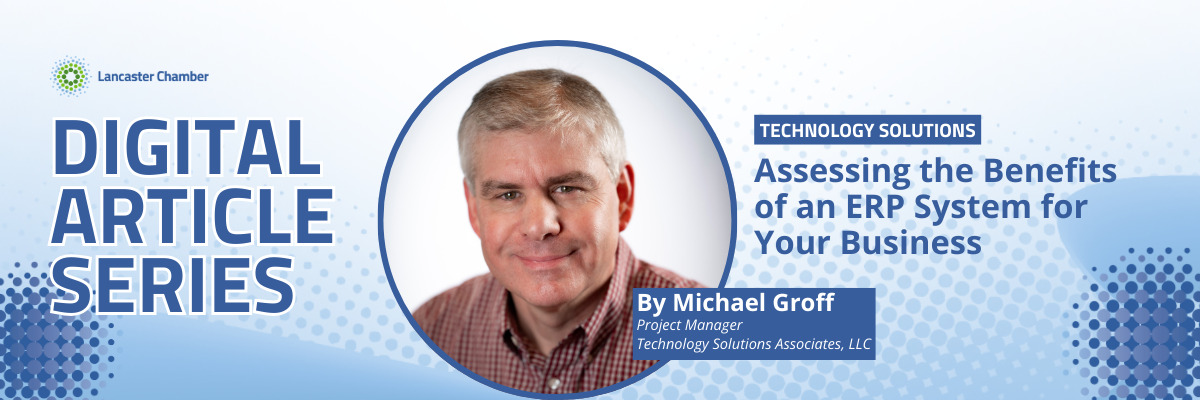By Michael Groff – A feature piece from our Fall 2024 issue of the Lancaster Thriving Publication!
Entrepreneurs often begin with a vision or innovative idea, and through dedication and hard work, they witness their businesses flourish. In the early stages, managing essential tasks with tools like QuickBooks or other small-business software is common. These tools handle fundamental functions such as check writing, invoicing, accounts receivable, and payroll. However, as a business grows, the need to manage additional aspects such as inventory, project costing, and other complex processes becomes apparent. At this point, many businesses resort to secondary systems or even spreadsheets for these tasks. While such solutions are manageable, while the business is small and the owner is closely involved, they can become inefficient and cumbersome as the business scales.
This evolution, where a business surpasses the capabilities of its initial systems, often leads to considering an Enterprise Resource Planning (ERP) system. An ERP system is a comprehensive software platform designed to integrate and streamline key business processes across various functions, including finance, inventory, manufacturing, point-of-sale, customer resource management, human resources, and supply chain management. An ERP system not only enhances operational efficiency but also provides a centralized view of business operations, offering a sense of relief in managing the growing complexity of business processes.
To determine if an ERP system would be advantageous for your business, consider the following:
- Process Evaluation and Optimization: Are you prepared to invest time evaluating and refining your processes to improve efficiency? This involves stepping back from day-to-day tasks to analyze and plan for enhancements. Observing pain points during peak periods and using these insights to strategize improvements during implementation.
- Integration and Streamlining: Can you identify areas where direct integration into an ERP system would significantly streamline operations? For example, a time-tracking tool that integrates seamlessly with the ERP system can enhance accuracy and efficiency.
ERP systems offer scalability, allowing businesses to start with essential features and expand as needs evolve. However, it is important to recognize that ERP systems require a significant investment. Costs typically start around $10,000 but can exceed $100,000 annually, depending on the required functionality and extent of use. For most small businesses, the cost of a well-suited ERP will likely start at 1% to 2% of annual revenue.
Timing and Expert Consultation: Identifying the optimal time for implementing an ERP system is crucial. Regular evaluations by an ERP specialist, approximately every three years, can help determine when it is appropriate to transition. These evaluations provide valuable insights into available options, benefits of new technology including automation and AI, and possible challenges during conversion, and will assist in strategic budget planning.
In conclusion, an ERP system can offer significant benefits in terms of streamlining and managing business processes more effectively, particularly as your company grows and becomes more complex. Evaluating the need for an ERP system and investing in it at the right time can enhance operational efficiency and support continued business success.
By Michael Groff
Project Manager
Technology Solutions Associates, LLC
Contact Michael at mgroff@techsola.com

For over 25 years, Technology Solutions has been dedicated to addressing IT and business software needs for a wide range of companies. Our expertise includes managed IT services, ERP implementation and support, including custom modifications and applications. Our team of network engineers, Microsoft MVP software developers, MBAs, and project managers form the perfect mix to manage and optimize complex business systems.
not secure

